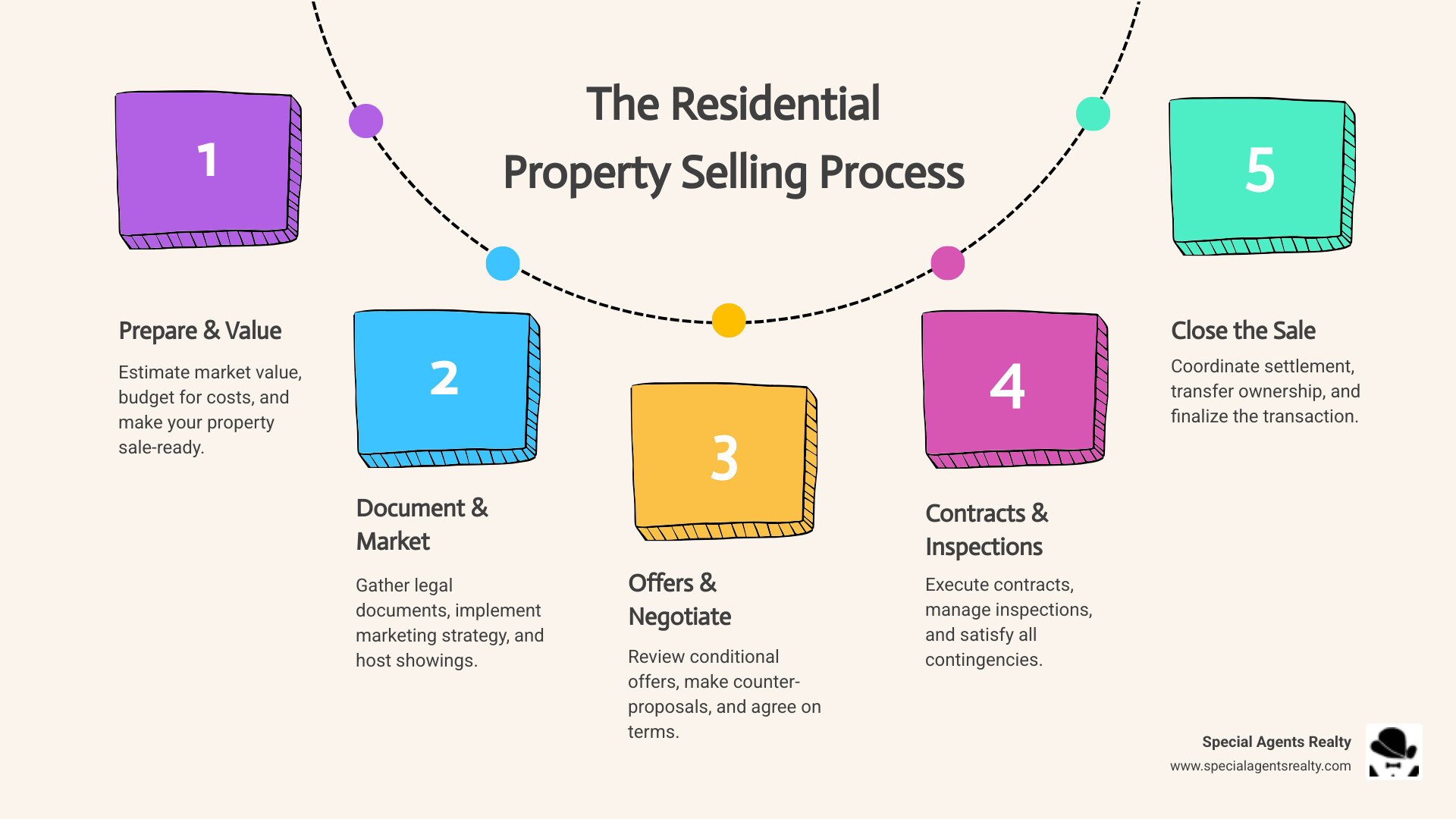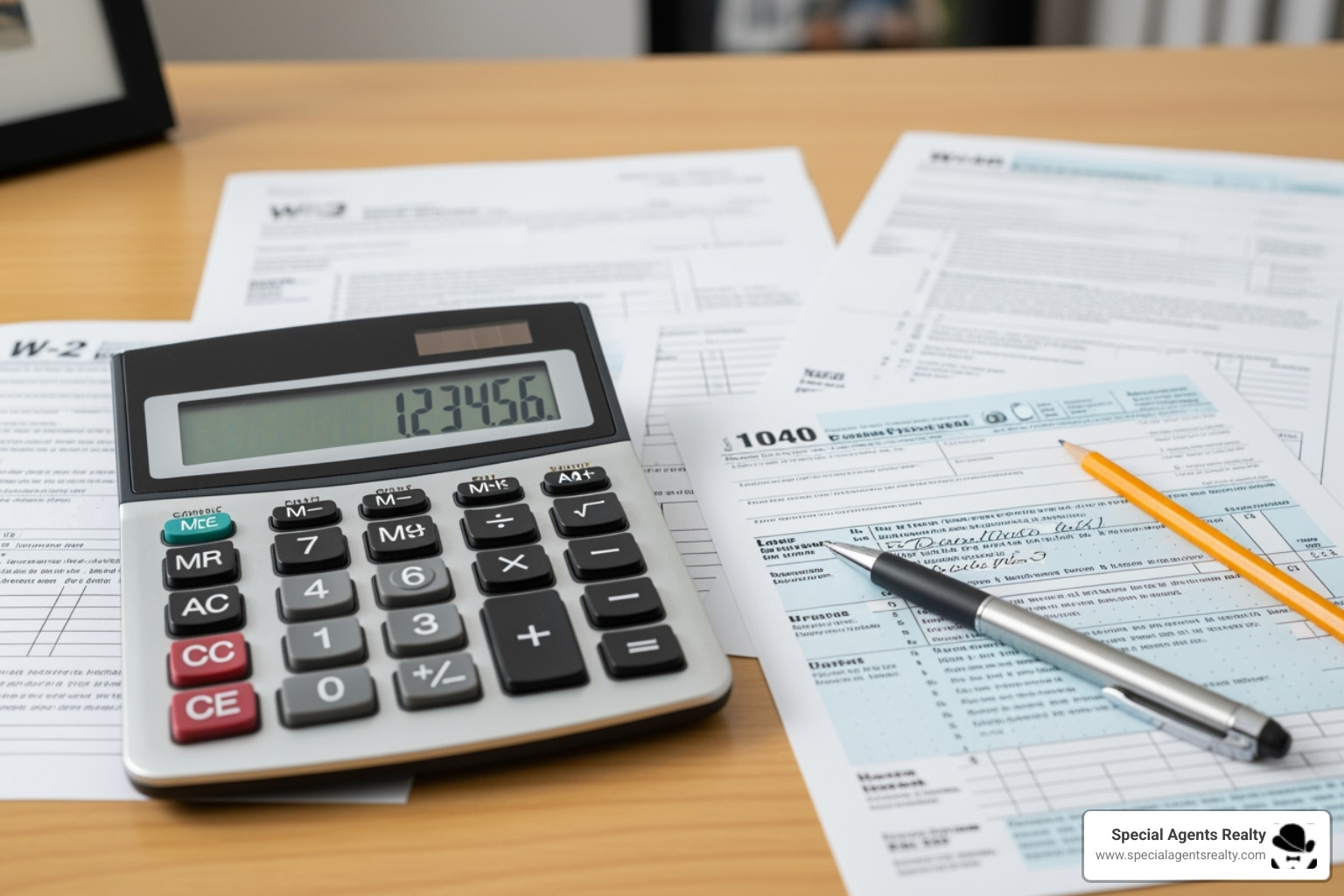
Why Understanding the Property Selling Process Matters
When you sell residential property, you're starting on a major financial transaction. Since the average person moves only every 15 to 20 years, the process can feel unfamiliar. It involves multiple stages and key decisions that can impact your final proceeds by thousands of dollars.
The core steps to sell residential property successfully are:
- Prepare Your Home - Estimate market value, budget for selling costs, and make your property sale-ready
- Gather Documentation - Collect title deeds, property tax receipts, warranties, and inspection reports
- Choose Your Selling Method - Decide between using a real estate agent or selling privately
- Market Your Property - Create listings, hold showings, and attract qualified buyers
- Negotiate Offers - Review conditional offers, make counter-proposals, and accept terms
- Complete Legal Requirements - Work with legal representatives to finalize contracts and disclosures
- Close the Sale - Coordinate settlement, transfer ownership, and move out
The typical property sale takes about 12 weeks from accepting an offer to completion. This period involves coordinating with buyers, managing complex paperwork, and understanding financial implications like capital gains tax. While profits from a sale can be taxable, exemptions often reduce or eliminate this tax.
Many sellers feel overwhelmed by the complexity, but having expert guidance can mean the difference between a stressful experience and a smooth, profitable transaction. Understanding what to expect at each stage helps you stay in control and make informed decisions that protect your interests.

Preparing for the Sale: Strategy and Valuation
Before the "For Sale" sign goes up, crucial groundwork is needed. Getting the price right, understanding your costs, and assembling the right team will shape the entire process when you sell residential property.

How to Estimate Your Property's Market Value
Setting the right price is critical. Price too high, and you deter buyers; too low, and you lose money. The best starting point is a Comparative Market Analysis (CMA) from a real estate agent, which compares your home to similar, recently sold properties in your area. It's based on what buyers are actually paying right now.
A professional appraisal offers a more detailed, independent valuation, which can be useful for complex sales. While online valuation tools provide a quick estimate, they often miss important nuances like recent renovations or unique property features. It's also important not to rely solely on your property's Rating Value (used for taxes), as it may be outdated and not reflect true market value.
Local market conditions in the Pacific Northwest—such as inventory levels and buyer demand—directly impact what buyers will pay. For more on this, see our post on Setting the Price or learn more about determining your property's value.
Budgeting for Home Selling Costs
Selling a home isn't free. Expect to spend roughly 6-10% of your home's sale price on various costs. Understanding these upfront helps you calculate your net proceeds.
The largest expense is usually realtor commissions (4-6% of the sale price), which covers marketing, negotiation, and administrative work. Legal fees are necessary for the title transfer, and closing costs (1-3%) include title insurance and escrow fees. Our guide on Closing and Title Costs details these further.
Other potential expenses include:
- Staging costs to improve your home's appeal.
- Home inspection repairs to address issues before they become deal-breakers.
- Mortgage prepayment penalties if you pay off your loan early.
- Moving expenses for professional movers and supplies.
Planning for these costs now prevents surprises later.
The Value of Working with a Real Estate Professional
While selling on your own (FSBO) is an option, it means you're responsible for pricing, marketing, showings, negotiations, and complex legal paperwork. A skilled real estate broker handles all of this for you.
Agents provide marketing expertise through professional photography, MLS listings, and targeted advertising. Their negotiation skills can secure a better price and more favorable terms. They also manage the extensive paperwork involved in a transaction, ensuring contracts and disclosures are completed correctly to avoid delays or legal issues.
A good agent is your advocate and advisor, helping you analyze the market and make strategic decisions. Our post on Finding the Right Agent can help you choose the right partner, and you can find out what to look for in a realtor to make an informed choice. An agent's role is to guide you through the entire journey to sell residential property successfully.
The Essential Guide to Sell Residential Property
With your strategy in place, it's time for the practical work of preparing your home for buyers. This phase transforms your lived-in space into a market-ready property that captures attention.
Key steps to sell residential property successfully
When you sell residential property, the first practical steps are crucial for making a strong impression.
Home preparation is where it begins. Start by decluttering to help buyers envision their own life in the space. Next, tackle repairs—fix that dripping faucet or loose doorknob. Small fixes show buyers the home has been well-maintained. Don't forget curb appeal; a tidy garden and a freshly painted front door make a great first impression. A deep clean throughout the house signals pride of ownership.
Next, create a professional listing. High-quality photos are essential in today's digital market, as they form a buyer's first impression. Pair them with a compelling description highlighting your home's best features. Your marketing plan should be comprehensive, using major listing platforms, social media, and targeted advertising to reach the right audience.
Finally, your agent will coordinate showings and open houses, managing logistics and gathering valuable feedback. The goal is to present your home in a way that generates excitement and competitive offers. For more insights, check out our guide on Getting the Highest Price in the Shortest Time or review government resources on Planning to sell.
Gathering the Necessary Documents for a Smooth Sale
Organizing your paperwork early can prevent major delays. Buyers and their lenders need these documents to perform their due diligence, so having them ready shows you're a serious and prepared seller.
Key documents to gather include:
- Property title deed: Proves you legally own the property.
- Survey plan: Shows property boundaries and dimensions.
- Property tax receipts and utility bills: Verify current costs and payments.
- Renovation contracts and permits: Give buyers confidence that work was done professionally.
- Appliance warranties: Transferable warranties for furnaces or kitchen appliances add value.
- Pre-listing home inspection report: Builds trust and demonstrates transparency.
- Mortgage statements: Show the outstanding balance and any prepayment penalties.
- Leasehold documents (if applicable): For condos, this includes details on the lease term, ground rent, and service charges.
Having these documents organized speeds up the process and prevents last-minute scrambling. Your legal representative will guide you on specifics, and you can learn more about Understanding the sale and purchase agreement when selling — settled.govt.nz.
Navigating Offers and Negotiations
Once your property is on the market, the next phase begins: receiving and negotiating offers. This is where strategic thinking and expert guidance are essential.

Understanding Conditional Offers
A conditional offer is a purchase proposal with built-in safety nets for the buyer. These conditions must be met for the sale to become final. If they aren't, the buyer can walk away without penalty.
Common conditions include:
- Home inspection contingency: Allows the buyer to have the property professionally inspected. If major issues are found, they can request repairs, a price reduction, or withdraw the offer.
- Financing contingency: Makes the offer dependent on the buyer securing a mortgage. If their loan is denied, the deal is off.
- Sale of buyer's property contingency: The buyer must sell their current home to purchase yours. This can add uncertainty and delays to the timeline.
Each condition has a deadline. While conditional offers are normal, they carry risks. An agent can help you evaluate each offer based on its price and the strength of its conditions. Our article on Considering Offers explores this topic in greater depth.
The Art of the Counter-Proposal and Negotiation
When you receive an offer, you can accept it, reject it, or make a counter-proposal. Most deals involve some negotiation through a counter-proposal.
Negotiation isn't just about price. You can also negotiate other key terms, including:
- The closing date: Adjust it to fit your moving timeline.
- Included items: Clarify which appliances, light fixtures, or window treatments will stay or go.
- The conditions themselves: You can propose shorter timelines for inspections or request a larger deposit to increase the buyer's commitment.
Negotiation is a conversation, not a confrontation. Most buyers expect some back-and-forth, so don't feel pressured to accept the first offer. Your agent will help you craft responses that protect your interests and move you toward a successful sale. For more guidance, the resource on Receiving and making counter offers — settled.govt.nz offers valuable insights.
Our job is to help you see the full picture of each offer so you can make decisions that serve your best interests when you sell residential property.
Understanding the Financial and Tax Implications
When you sell residential property, the contract price is only part of the financial story. Understanding tax rules and financial strategies can significantly impact your net proceeds.

Tax implications when you sell residential property
When you sell a home for more than you paid, the profit is a capital gain. To calculate it, take your sale proceeds (sale price minus selling costs) and subtract your adjusted cost base (original purchase price plus the cost of major capital improvements).
For example: If you bought a home for $300,000, added $50,000 in improvements, and sold it for $500,000 with $30,000 in selling costs, your capital gain is $120,000.
In the United States, the Principal Residence Exclusion under Section 121 of the tax code is a major benefit. It allows you to exclude a large portion of this gain from taxes. Single filers can exclude up to $250,000, and joint filers can exclude up to $500,000.
To qualify, you must meet two tests: the ownership test (owned the home for at least two of the last five years) and the use test (lived in it as your main home for at least two of the last five years). These years don't need to be consecutive.
Tax laws are complex and vary by location, so we always recommend consulting a tax professional. You can also learn more about what you need to know when you buy and sell residential property for a broader overview.
What is 'Flipping' and Its Tax Consequences?
"House flipping" has specific tax consequences. If you sell residential property you've owned for less than 365 consecutive days (and not due to a qualifying life event), tax authorities may consider it a flip. This means the profit is treated as business income, not a capital gain.
This distinction is critical for three reasons:
- The profit is ineligible for the principal residence exclusion.
- Business income is taxed at your full marginal rate, which is typically higher than capital gains rates.
- Any loss from the sale is generally deemed nil for tax purposes and cannot be deducted.
Exceptions are made for certain life events, such as a death, marriage breakdown, job relocation, or serious illness. If you're considering selling a property you've owned for less than a year, professional tax advice is essential.
Porting Your Mortgage: What You Need to Know
If you're buying a new home while selling your old one, mortgage porting lets you transfer your existing mortgage—with its current rate and terms—to your new property. This is especially valuable if you have a low interest rate or want to avoid costly prepayment penalties for paying off your mortgage early.
Not all mortgages are portable, so check with your lender first. They will still need to approve you and the new property, reviewing your income, credit, and debt. The main benefit is avoiding prepayment penalties, which can save you thousands.
Timing is crucial, as most lenders require the new mortgage to be in place within 30 to 90 days of the sale. An experienced agent can help coordinate this process. Understanding all your financing strategies, including porting, is key. Our article on Where Does the Money Come From for Mortgage Loans can help you evaluate your options.
Frequently Asked Questions about Selling Your Home
When you prepare to sell residential property, questions are inevitable. Here are straightforward answers to some of the most common ones we hear.
How much does it really cost to sell a house?
Budget for roughly 6-10% of your home's sale price to cover all selling expenses. This figure prevents surprises at closing and gives you a realistic idea of your net proceeds.
The primary costs include:
- Agent commissions: Typically the largest expense, covering marketing, negotiation, and administrative work.
- Closing costs: Fees for services like title insurance, escrow, and legal work, usually adding up to 1-3% of the sale price. Our post on Closing and Title Costs provides more detail.
- Home preparation costs: Expenses for repairs, renovations, or professional staging to make your home more appealing to buyers.
- Other expenses: Don't forget costs like moving, temporary storage, or potential mortgage prepayment penalties.
For a $500,000 home, total costs could be between $30,000 and $50,000. Understanding this upfront makes the process less stressful.
Do I have to pay taxes when I sell my house?
For most homeowners in the United States, the answer is often no, thanks to the Principal Residence Exclusion (Section 121 of the tax code). This powerful tax break allows single filers to exclude up to $250,000 of profit (capital gains) and joint filers to exclude up to $500,000.
To qualify, you must meet two simple tests: the ownership test (you owned the home for at least two of the last five years) and the use test (you lived in it as your primary residence for at least two of those five years). The years don't need to be consecutive.
If your profit exceeds the exclusion limit, the excess amount would be subject to capital gains tax. Different rules apply to investment or rental properties. Since tax situations can be complex, it's always best to consult a tax professional. You can also learn more about what you need to know when you buy and sell residential property to understand the requirements.
What is the best time of year to sell a home?
While timing depends on your personal circumstances and local market, some seasonal trends can influence your sale when you sell residential property.
Spring (March-May) is traditionally the most popular season. Better weather and the desire for families to move before the new school year bring out more buyers, creating competition that can lead to better offers.
Fall (September-November) is another strong season. Buyers are often serious and motivated to close before the holidays.
Summer can be slower as families take vacations, but less competition from other sellers can make your listing stand out. Winter is generally the quietest period, but buyers who are active then are often highly motivated by job relocations or other pressing needs, which can result in a quick sale.
Factors like interest rates, local inventory, and your personal timeline are just as important as the calendar. In markets across the Northwestern United States, demand can be strong year-round. Our article on Hot Normal and Cold Markets can help you understand how current conditions might affect your timing.
Conclusion
Selling your home is a major life event, but with a clear roadmap, you can steer it successfully. We've covered the essential steps, from strategic pricing and home preparation to negotiating offers and understanding the financial implications.
The key takeaway is that preparation is everything. Taking the time to prepare your home and understand the process sets you up for a sale that achieves the right price with minimal stress.
You don't have to do it alone. At Special Agents Realty, we specialize in making the experience of selling residential property as smooth as possible for homeowners throughout the Northwestern United States. Whether you're in Seattle, Bremerton, Kirkland, or anywhere in the Puget Sound region, we provide personal care and expert guidance.
Our goal is a successful sale and a memorable real estate journey you can feel confident about. Ready to take the next step? View our current listings and market resources to see how we can support you. Let's steer this market together.
.avif)






